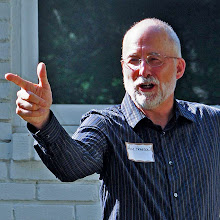What does this say about our society today? Perhaps not much. Speaking with Bob Garfield on the excellent weekly program, On The Media from WNYC and NPR, Weingarten said that these people were likely not ignorant boobs, but simply in a hurry. Having spent my share of time on that very Metro system as well as on the highways and byways of the DC area, I can vouch for the truth of that statement. Everyone, it seems, has a Very Important Job; the future of the Free World depends on them getting where they are going with no delay.
You may draw your own conclusions regarding the Joshua Bell experiment. I'd like to think I would have stopped, and perhaps even leaned against a pillar to listen for the duration. But suppose I'd been running late for a meeting?
 Still, imagine what life would be like if we were a little less driven, a little freer to stop and smell the roses when we come across them: in the form of a Bach Chaconne, a bluegrass tune, a mural, a living statue, a sidewalk painting, a lone saxophone player with a cool jazz riff... So a few meetings in Washington (or New York or Charlotte or Chicago) might start late -- or might not happen at all. Would that be so bad for the country?
Still, imagine what life would be like if we were a little less driven, a little freer to stop and smell the roses when we come across them: in the form of a Bach Chaconne, a bluegrass tune, a mural, a living statue, a sidewalk painting, a lone saxophone player with a cool jazz riff... So a few meetings in Washington (or New York or Charlotte or Chicago) might start late -- or might not happen at all. Would that be so bad for the country?Image: living statue, Las Ramblas, Barcelona (photo by Vincent Lowe),

